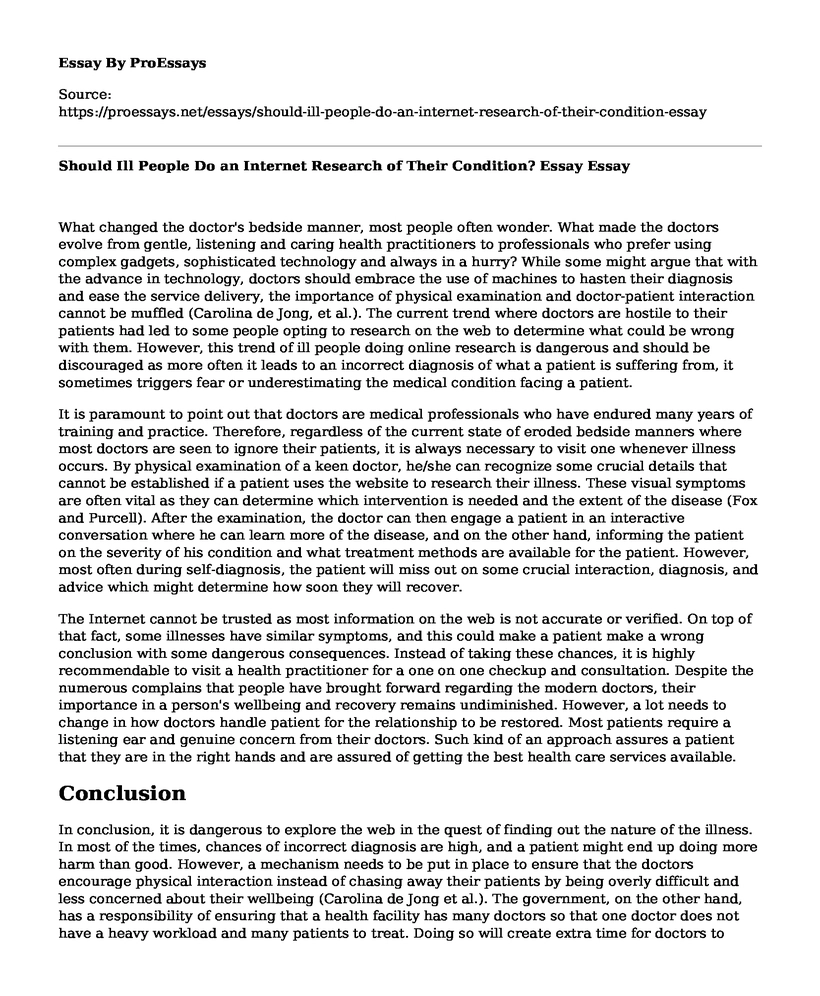What changed the doctor's bedside manner, most people often wonder. What made the doctors evolve from gentle, listening and caring health practitioners to professionals who prefer using complex gadgets, sophisticated technology and always in a hurry? While some might argue that with the advance in technology, doctors should embrace the use of machines to hasten their diagnosis and ease the service delivery, the importance of physical examination and doctor-patient interaction cannot be muffled (Carolina de Jong, et al.). The current trend where doctors are hostile to their patients had led to some people opting to research on the web to determine what could be wrong with them. However, this trend of ill people doing online research is dangerous and should be discouraged as more often it leads to an incorrect diagnosis of what a patient is suffering from, it sometimes triggers fear or underestimating the medical condition facing a patient.
It is paramount to point out that doctors are medical professionals who have endured many years of training and practice. Therefore, regardless of the current state of eroded bedside manners where most doctors are seen to ignore their patients, it is always necessary to visit one whenever illness occurs. By physical examination of a keen doctor, he/she can recognize some crucial details that cannot be established if a patient uses the website to research their illness. These visual symptoms are often vital as they can determine which intervention is needed and the extent of the disease (Fox and Purcell). After the examination, the doctor can then engage a patient in an interactive conversation where he can learn more of the disease, and on the other hand, informing the patient on the severity of his condition and what treatment methods are available for the patient. However, most often during self-diagnosis, the patient will miss out on some crucial interaction, diagnosis, and advice which might determine how soon they will recover.
The Internet cannot be trusted as most information on the web is not accurate or verified. On top of that fact, some illnesses have similar symptoms, and this could make a patient make a wrong conclusion with some dangerous consequences. Instead of taking these chances, it is highly recommendable to visit a health practitioner for a one on one checkup and consultation. Despite the numerous complains that people have brought forward regarding the modern doctors, their importance in a person's wellbeing and recovery remains undiminished. However, a lot needs to change in how doctors handle patient for the relationship to be restored. Most patients require a listening ear and genuine concern from their doctors. Such kind of an approach assures a patient that they are in the right hands and are assured of getting the best health care services available.
Conclusion
In conclusion, it is dangerous to explore the web in the quest of finding out the nature of the illness. In most of the times, chances of incorrect diagnosis are high, and a patient might end up doing more harm than good. However, a mechanism needs to be put in place to ensure that the doctors encourage physical interaction instead of chasing away their patients by being overly difficult and less concerned about their wellbeing (Carolina de Jong et al.). The government, on the other hand, has a responsibility of ensuring that a health facility has many doctors so that one doctor does not have a heavy workload and many patients to treat. Doing so will create extra time for doctors to interact with their patients freely and thus building the bridges of the doctor-patient relationship that have been destroyed in the recent times.
Works Cited
Fox, Susannah, and Kristen Purcell. "Chronic Disease and the Internet." Pew Research Center: Internet, Science & Tech, 24 Mar. 2010, www.pewinternet.org/2010/03/24/chronic-disease-and-the-internet/. Accessed 31/05/2018
Carolina de Jong, Catharina, et al. "The Effects on Health Behavior and Health Outcomes of Internet-Based Asynchronous Communication Between Health Providers and Patients With a Chronic Condition: A Systematic Review." Journal of Medical Internet Research, 16 Jan. 2014, www.jmir.org/2014/1/e19/. Accessed 31/05/2018
Cite this page
Should Ill People Do an Internet Research of Their Condition? Essay. (2022, May 26). Retrieved from https://proessays.net/essays/should-ill-people-do-an-internet-research-of-their-condition-essay
If you are the original author of this essay and no longer wish to have it published on the ProEssays website, please click below to request its removal:
- Child Crisis Arizona: Speech
- The Future of Internet in Canada - Essay Sample
- Paper Example on Nurse Practitioners: A Growing Need for Quality Healthcare
- Management of Disaster Events
- Essay Sample on Crisis Ahead: Nursing Shortage Impacts Healthcare Business
- COVID-19: Global Crisis, Economic Impact, & Health Care Struggles - Research Paper
- Free Essay Sample on Elderly Nutrition: Challenges Posed by Loss of Teeth







